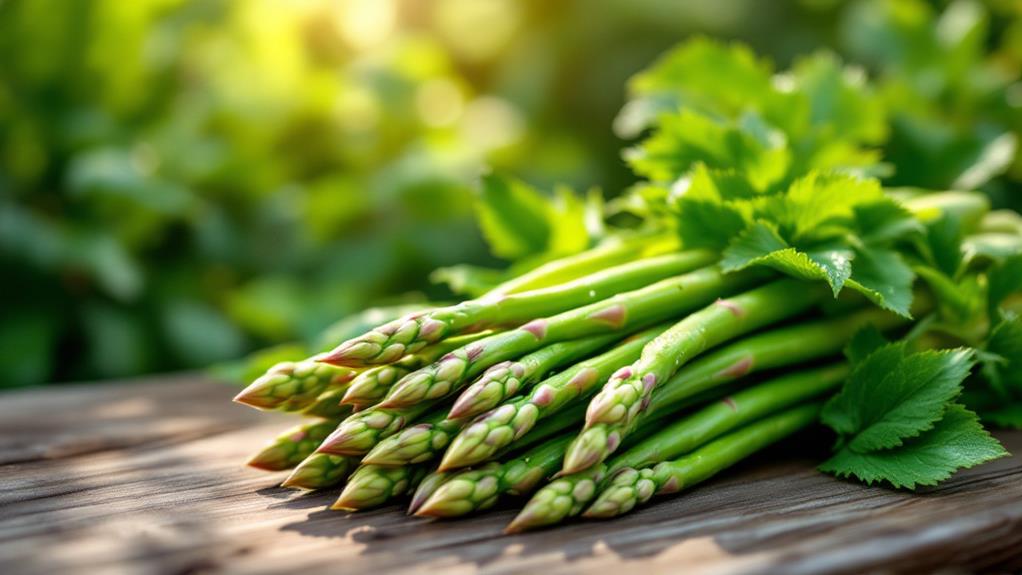The Complete Guide to the Types and Health Benefits of Mangoes

You'll find mangoes come in over 1,000 varieties, each with distinct flavors like the sweet-sour Honey mango or the sweet Francis mango. Nutritionally, mangoes are a powerhouse, offering vitamin C for immune health, fiber for digestion, and antioxidants to reduce cancer risk. They improve any dish, be it a tropical fruit salad or a savory salsa. To enjoy them at their best, pick ripe ones with a sweet aroma and store them correctly. However, be cautious if you're allergic to similar substances. There's more to investigate about this juicy fruit's benefits and uses.
Types of Mangoes
Mango diversity brings a burst of flavor and color to the table, with over 1,000 varieties to investigate. Each type of mango offers a unique experience in taste, texture, and appearance. Take the Honey Mango, for instance. It's celebrated for its sweet-sour flavor and high flesh-to-seed ratio, making it a favorite in Mexico, Peru, and Ecuador. Its lively color and delightful taste promise a tropical escape in every bite.
Then there's the Francis Mango, a staple in Haiti. This variety entices with bright yellow skin and a soft, juicy texture. Its sweet and fruity flavor is perfect for those craving a luscious treat. The Haden Mango, with its medium to large size, sports vivid red skin with green and yellow undertones. Grown in Mexico and Florida, it combines a sweet-sour taste that's both invigorating and satisfying.
Nutritional Profile
In terms of nutrition, this tropical fruit packs a punch. When you enjoy a cup of chopped mangoes, you're consuming just 99 calories, but those calories are rich in nutrients. This serving size includes 1.4 grams of protein, 0.6 grams of fat, and 24.8 grams of carbohydrates, with 22.6 grams coming from natural sugars. Despite the sweetness, mangoes offer an impressive nutritional profile.
Mangoes are especially renowned for their high vitamin C content. One cup provides nearly 75% of your daily vitamin C needs, fundamental for enhancing immune function and promoting skin health. In addition, mangoes contain vitamins A and K, known for supporting vision, immune health, and blood clotting.
Dietary fiber is another important component, with 2.6 grams per cup of mango. This fiber content supports digestive health by aiding regular bowel movements and alleviating constipation. Moreover, mangoes are a great source of minerals like potassium and magnesium. These minerals play significant roles in maintaining heart health and regulating blood pressure.
Incorporating mangoes into your diet not only satisfies your sweet tooth but also provides considerable nutritional benefits, making them a delicious and healthy choice.
Health Benefits

While enjoying the nutritional richness of mangoes, you'll also uncover a range of health benefits that extend beyond basic nourishment. Mangoes are packed with vitamin C, delivering nearly 75% of your daily requirement in just one cup. This vitamin enhances your immune system and helps with iron absorption, contributing considerably to your comprehensive health. But that's just the beginning of what mangoes offer.
- Digestive Health: Thanks to their rich dietary fiber content, mangoes can improve your digestive health and may work better than soluble fiber supplements in relieving constipation.
- Cancer Risk Reduction: Loaded with antioxidants like beta-carotene and polyphenols, mangoes help reduce oxidative stress, which may lower your cancer risk.
- Heart Health: Mangoes contain potassium and magnesium, vital for maintaining healthy blood pressure and circulation, supporting your heart's health.
- Eye Health: The presence of lutein and zeaxanthin in mangoes contributes to eye health, possibly reducing the risk of age-related macular degeneration.
Incorporating mangoes into your diet offers these diverse health benefits, making them a delicious and nutritious choice for your comprehensive well-being.
Culinary Uses
A delightful array of culinary possibilities awaits as you incorporate mangoes into your meals. As a flexible enhancement, mangoes can be enjoyed fresh, sliced, or diced, instantly elevating tropical fruit salads and smoothies with their lively flavor and nutritional uplift. For savory dishes, consider using mangoes in salsas; they provide a sweet contrast to spicy ingredients like jalapeños and cilantro, creating a perfect balance of flavors.
Dried mango is another wonderful option, serving as a convenient snack or a topping for salads and trail mixes. It adds natural sweetness without the need for added sugars, making it an excellent choice for health-conscious individuals. In relation to desserts, mango puree shines as a star ingredient in sorbets and puddings. It offers a creamy texture and lively flavor while acting as a healthier alternative to processed sugars.
The natural sweetness of mangoes also allows them to replace added sugars in numerous recipes, making them an excellent ingredient for crafting healthier versions of sauces, dressings, and baked goods. With so many culinary uses, mangoes can transform your dishes into tropical delights, ensuring both taste and health benefits.
Growing Conditions

Mango trees, known for their resilience, thrive best in warm, tropical climates, where temperatures range between 70°F and 85°F (21°C to 29°C). For ideal growth and fruit production, it's essential to plant them in the right conditions. Here's how to guarantee your mango trees flourish:
- Well-drained Soil: Mango trees prefer sandy loam soil with a pH between 5.5 and 7.5. This type of soil supports healthy root development, providing a strong base for your trees.
- Regular Watering: While mango trees need consistent watering, especially during dry spells, be cautious of overwatering. Too much water can lead to root rot, harming your tree's health and fruit yield.
- Fertilization: Provide balanced fertilization every few months during the growing season. This practice will improve fruit yield and overall tree health, giving you a healthy yield of delicious mangoes.
- Cold Protection: Since mango trees are frost-sensitive, plant them in late winter to early spring. During colder months, protect them to prevent cold damage, guaranteeing continued growth and fruit production.
Following these guidelines will help you cultivate mango trees successfully, leading to bountiful harvests and lively, healthy plants.
Selection and Storage
After successfully growing your mango trees, the next step is to confirm you select and store your mangoes properly for the best taste and longevity. In terms of selection, look for mangoes that emit a sweet aroma and yield slightly to gentle pressure. These signs are better indicators of ripeness than skin color, confirming you enjoy all the health benefits mangoes offer.
To ripen mangoes, keep them at room temperature until they soften slightly. You can speed up the ripening process by placing them in a paper bag, which traps ethylene gas. Once ripe, transfer your mangoes to the refrigerator, where they can stay fresh for up to 5 days. If you've already peeled and sliced them, store the pieces in an airtight container to maintain their quality.
For long-term storage, consider freezing mango cubes. When frozen, they can last up to 6 months, making them perfect for smoothies and other recipes. This method helps retain their nutrients, so you can enjoy mangoes and their health benefits year-round. Proper selection and storage confirm you make the most out of your mango harvest, keeping them delicious and nutritious.
Potential Side Effects

While mangoes are celebrated for their delicious taste and numerous health benefits, a few potential side effects may affect certain individuals. If you're sensitive to poison ivy, be cautious. Mango skin contains urushiol, which might trigger allergic reactions similar to those from poison ivy. You could experience tingling or burning sensations in your mouth. Here are a few other considerations:
- Latex Allergies: If you have latex allergies, consuming mangoes might cause cross-reactive symptoms, such as swelling and oral discomfort. It's important to monitor your body's response after eating them.
- Skin Reactions: Occasionally, people report skin reactions that resemble poison ivy rashes after consuming mangoes. These rashes can last several days, so if you notice any unusual symptoms, it's wise to take note.
- Digestive Discomfort: Due to their high fiber and sugar content, eating too many mangoes might lead to digestive discomfort. Moderation is key to enjoying mangoes without issues.
- Consult a Healthcare Professional: If you suspect you're having an allergic reaction, consult a healthcare professional. Allergy testing can provide clarity, especially if you have known sensitivities.




